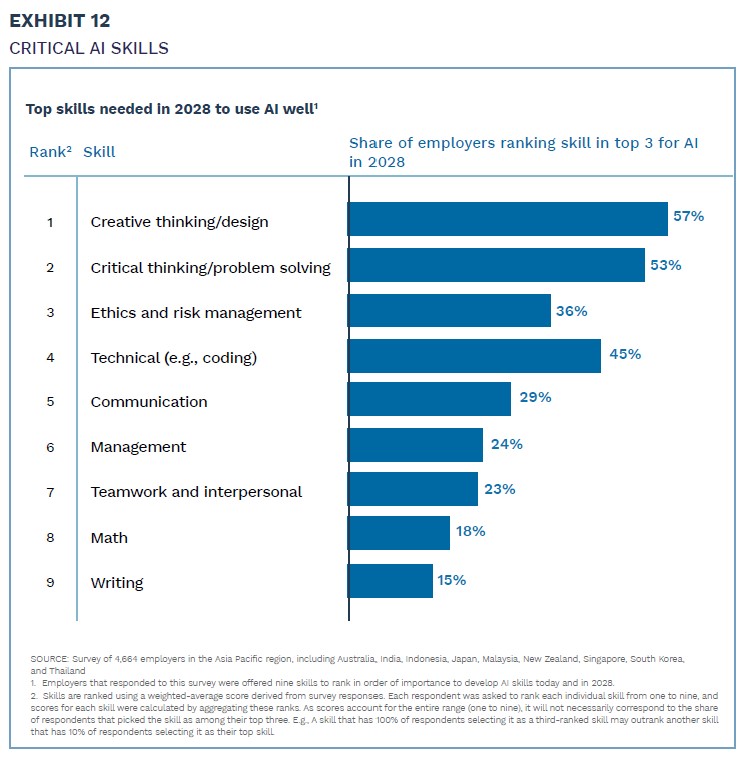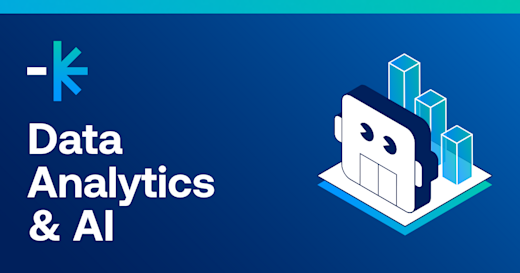Big Data, cloud computing and artificial intelligence remain the next big frontiers for innovation. The World Economic Forum's "Future of Jobs Report" reveals that 75% of organisations plan to adopt these technologies in the next five years.
However, a significant hurdle is the need for more skilled talent. Organisations must understand the top skills needed to leverage AI effectively and invest in upskilling their staff to realise these transformative steps.
The WEF's findings show that:
More than one billion jobs will be radically transformed in the next decade. And nearly half (44%) of workers' core skills will be disrupted within the next four years.
What does this disruption mean? A nuanced view sees it shifting how we work in several ways:
Automating Routine Tasks: Workers must develop new skills to handle more complex tasks that AI cannot perform.
Demand for Advanced Technical Skills: What skills can AI not replace? There is a higher demand for skills in managing, developing and programming AI systems.
Changing Skill Requirements: AI changes the nature of some jobs, leading to a shift in the skills required. For example, a data analyst must now understand machine learning algorithms beyond traditional statistical methods.
Enhanced Decision-Making: AI's ability to process vast amounts of data can assist with informed decision-making. Those who can interpret AI outputs, contextualise them and make decisions based on them will stand out.
New Ways to Collaborate: As AI systems increasingly work alongside humans, workers need to develop skills in collaborating with AI. Understanding how AI can augment human capabilities will make workers feel included in the future workforce.
Ethical and Social Implications: There is a growing need to understand AI's impact on different communities and to consider diversity, equity and inclusion principles.
Adaptability is the name of the game. Professionals and organisations must engage in lifelong learning through programs like AWS AI training to keep their capabilities up to date.
Make your investments count with AWS AI training
AI training programs will be crucial to remain competitive. Staff participation in AWS Training provides numerous advantages. It immediately impacts project outcomes, helps innovate customer-facing products and services faster, and closes skills gaps.
Data from “Understanding the Value of AWS Training to Organizations,” Enterprise Strategy Group Research Insights Paper commissioned by AWS notes that:
94% of decision-makers say having staff with AWS Training positions the company to be more competitive over the next 3-5 years.
92% agree that employing AWS-trained staff has significantly improved operational efficiency.
92% agree that employing AWS-trained staff has helped close the organisation’s skills gaps.
91% agree that employing AWS-trained staff immediately impacts successful and faster project completion.
90% agree that employing AWS-trained staff helps them innovate faster in customer-facing offerings.
The more training, the better, too. Organisations whose staff consume more AWS Training report reducing overall IT costs by 28% more than those with less AWS Training. In this context, more means eight+ days of coursework vs. two days or less.
What skills do you need for AI?
What AI skills should one learn? In addition to technological literacy, the WEF cites analytical thinking, creative thinking, resiliency, motivation, curiosity, and empathy as top skills for the future.
This aligns with the 2024 AWS Report on AI Skills in the Workplace. Data from here shows that the top skills needed for people to use AI well include critical thinking/design, problem solving, ethics and risk management, technical (e.g. coding), communication, management, teamwork, math and writing.
How to improve AI skills
Organisations must be strategic with their AWS AI and ML training programs, given the benefits and requirements for closing the AI skills gap.
An AWS AI and Machine Learning (ML) training strategy should cover essential components like Training, Certification, Tools and Community to ensure thorough knowledge and practical skills:
1. Training
An AWS AI course like AWS Certified Machine Learning Engineer - Associate provides a broad overview of AWS ML services. AWS AI Certified Practitioner validates in-demand knowledge of artificial intelligence (AI), machine learning (ML), and generative AI concepts and use cases. While AWS Certified Solutions Architect - Associate validates your skills and knowledge in designing cost- and performance-optimised solutions and the AWS Well-Architected Framework.
Hands-on labs and workshops provide practical experience with AWS ML services, such as Amazon SageMaker.
Specialised courses like AWS Deep Learning focus on more comprehensive techniques. Training on specific AWS AI services like Amazon Rekognition, Amazon Comprehend, and Amazon Polly is also available.
2. Certifications
Students can prepare for exams by reviewing comprehensive study guides, practice exams, and AWS whitepapers specific to the certification for Machine Learning, AI Engineer or AI Developer roles.
In addition, AWS provides an official “Exam Readiness” course to help candidates prepare for the certification exam.
3. Tools
Beyond AWS AI training, familiarisation with different tools helps build confidence in one's technical skills.
An AI engineer or developer can immerse themselves in Development tools like Amazon SageMaker to build, train, and deploy AI and ML models and use AWS ML SDKs in Python, Java, and other languages to interact with AWS ML services.
When it comes to Integration and Automation, tools like AWS Step Functions help build and orchestrate ML workflows. AWS Lambda helps run code in response to events and integrate ML predictions into applications.
For Data Management, Amazon S3 helps with the scalable storage of large datasets, and AWS Glue assists with ETL (extract, transform, load) operations.
4. Community
This is the last piece of the puzzle for how to improve AI skills. Discussion Groups like AWS Discussion Forums, LinkedIn Groups, GitHub Repositories, and Stack Overflow offer spaces for AI engineers or developers to engage with the AWS community, ask questions and share knowledge. Students can also contribute to and learn from AWS ML-related open-source projects.
Virtual and In-Person Events like AWS Summits, re:Invent and Local Meetups help students learn from AWS experts, connect with other learners and network with peers.
Mentorship and Collaboration Programs offer students the chance to get guidance from experienced AWS ML practitioners. Working on collaborative projects offers practical experience and helps build a portfolio. An example is AWS Jam Session: Architecting on AWS, a one-day course focusing on creative problem-solving. It is a gamified event, with teams competing to score points by completing various challenges.
This multi-faceted approach prepares learners for certifications and effectively implementing and managing ML solutions on AWS.
Businesses can seek the support of an AWS training partner like Lumify Work to identify skills gaps using the AWS Learning Needs Analysis (LNA) tool. It is particularly beneficial for companies that are unsure which staff members have the right skills.
An AWS training partner can help map out the different roles and to address questions like "What skills do our AI engineers need?". From there, you can customise training plans.
Partnering for Successful AWS AI Training
Lumify Work is an Advanced Tier AWS Training Partner in Australia, New Zealand and the Philippines. Through our Authorised AWS Instructors, we can provide a learning path for AWS AI training that is relevant to you and your organisation.
We aim to make the best learning solutions accessible. Lumify Work offers flexible delivery modalities with Lumify Anywhere.
Explore how to close the cloud and AI skills gap. Download our eBook "The Value of AWS Cloud Certifications - Futureproof Your Team."







